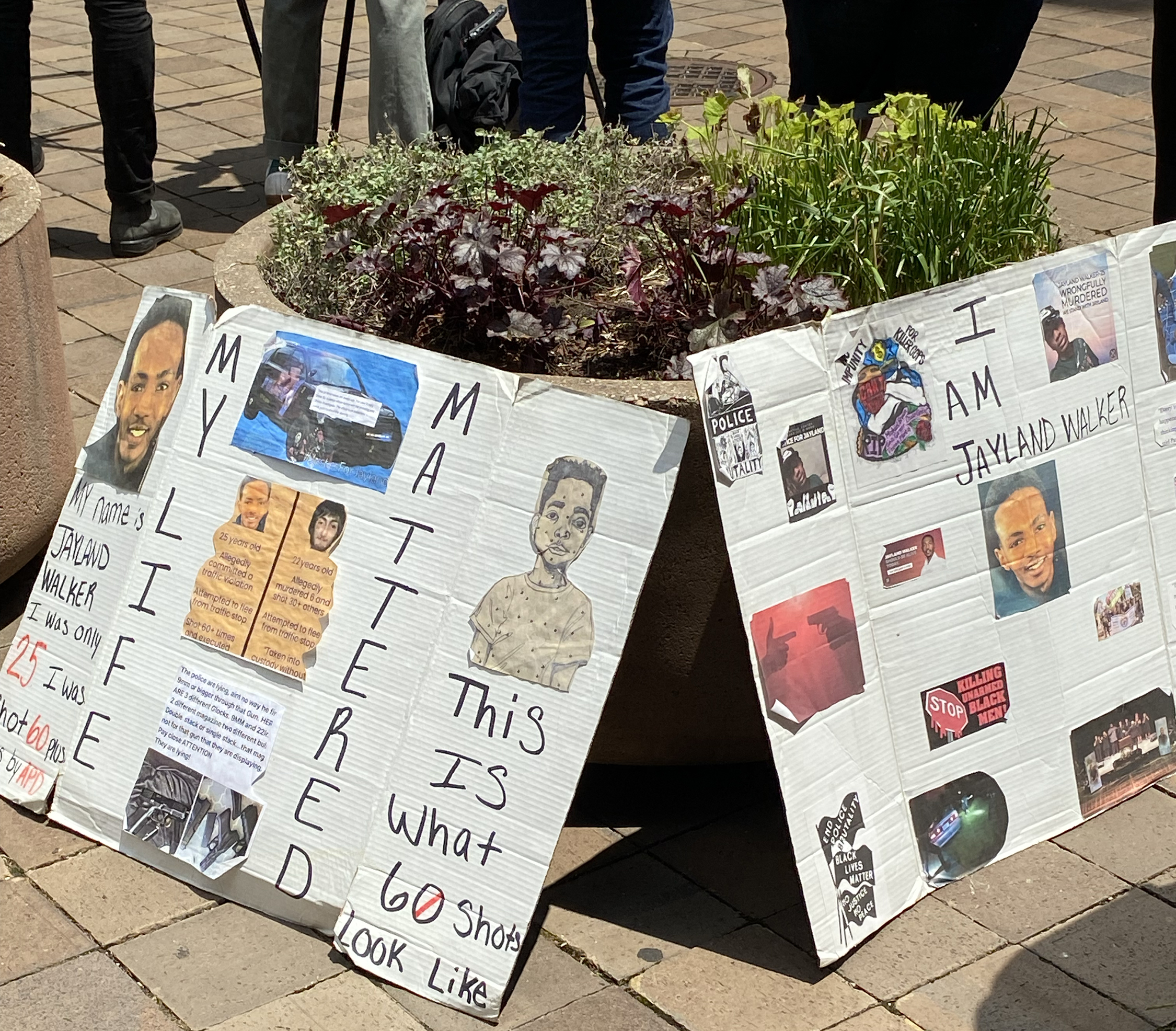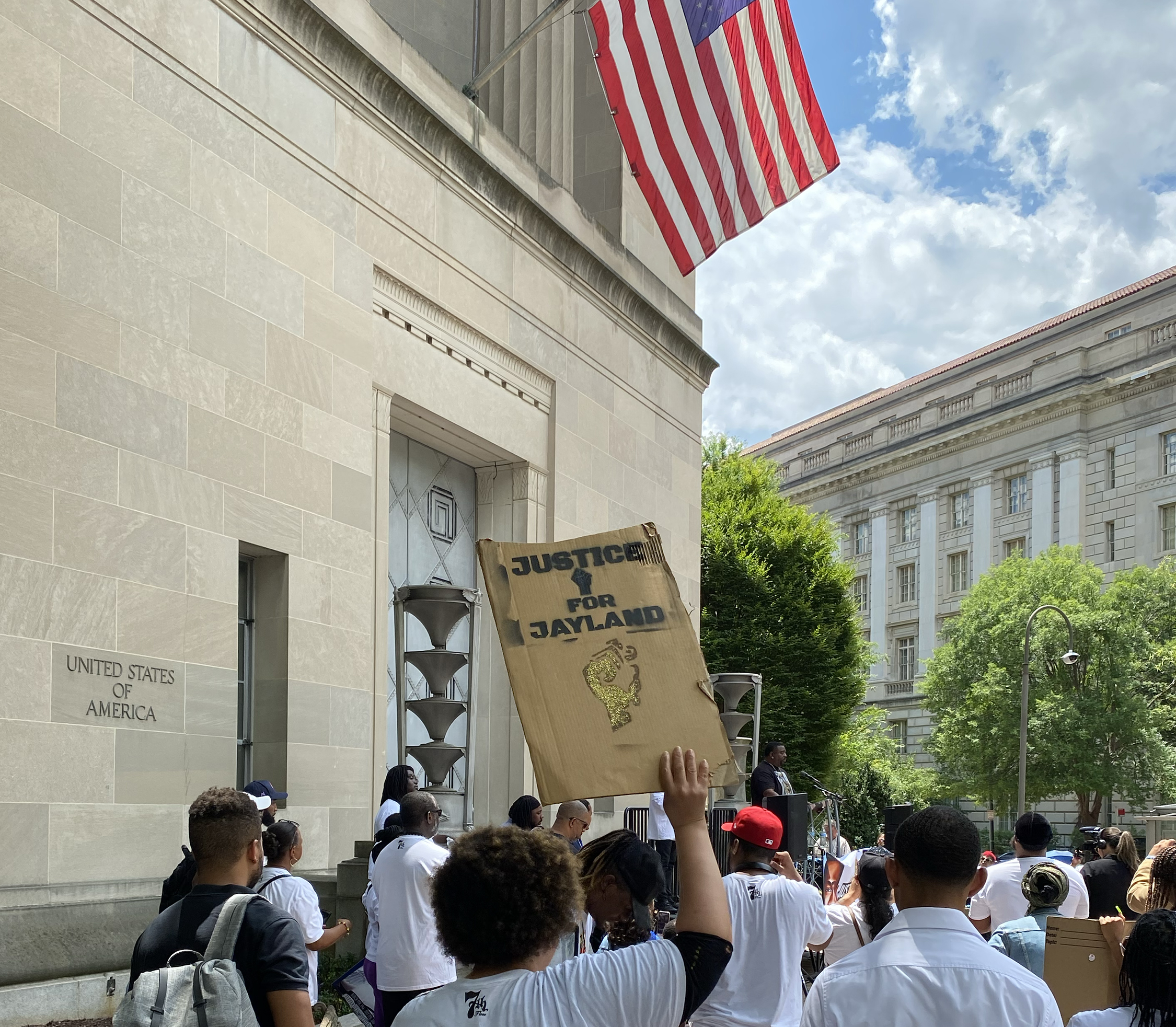
By Waleed Waite
Trinity Times Correspondent
Activists traveled from Akron, Ohio, this summer to Washington and demanded the Department of Justice take notice of a growing movement calling for police reform, noting that excessive force used against Black men and women had gone on far too long.
The June 27, 2023, “Justice for Jayland” rally in the nation’s capital came a year to the day Akron police officers fired dozens of shots at Jayland Walker, a 25-year-old Black man who apparently led authorities on a chase following a failed effort to stop the vehicle he was driving. Walker died from his injuries.
The Walker incident is just one of many examples around the U.S. where police officials are accused of using unnecessary deadly force against Black men and women, with continuous pleas for national reforms for law enforcement agencies throughout the country.
Officials at Trinity Washington University have been making these same calls for police reform and are urging students to get involved in the movement.
“If we don’t confront the evils of racism and white supremacy and police brutality, who will?” Trinity President Patricia McGuire asked in her blog posted on Jan. 29, 2023.

“We have to continue to fight,” said Tamika D. Mallory of the social justice organization Until Freedom, who traveled from New York to attend the “Justice for Jayland” rally. “We have to continue to be out here organizing and we have to continue to push our legislators to do their job, which is to ensure that there is legislation that protects us. The only way to make sure the legislators do their job is for us to vote and to participate in the process.”
Police reform advocacy was reignited following the conviction of a Minneapolis police officer in the 2020 murder of George Floyd.
Video showing a police officer with his knee on the neck of Floyd, an unarmed Black man, sparked civil rights protests across the U.S.
Reform advocates continue to point to the fatal encounters of other Black men and women with police in the cases of Amadou Diallo in New York, Oscar Grant in Oakland, California, Michael Brown in Ferguson, Missouri, and Tyre Nichols in Memphis, Tennessee.
“Organizations like the Black Panther Party for Self-Defense, The Young Lords and Pan-African Community Action (PACA) here in D.C. have organized around these efforts for years,” said Kimberly Monroe, assistant professor of Global Affairs at Trinity and the university’s advisor to the Black Student Alliance. “Students and youth might be able to help in a movement by first joining an organization within communities that are heavily policed and vulnerable to police brutality, like Southeast D.C. It’s also important to do research on the history of policing in Black and Brown communities.”
Poor, working class and oppressed people are affected by policing and statistically more vulnerable to police brutality, Monroe told Trinity Times.
“Black communities in particular are heavily policed and are considered domestic colonies similar to those during the colonialization period in Africa,” she said. “The militarization of police is happening nationally and internationally. For instance, ‘Cop City’ in Atlanta is a recent example of how policing is becoming militarized and affecting the most impacted communities. It is also important for me to think myself in connection to the (police-related deaths) of Sandra Bland, Breonna Taylor, and the countless Black women whose names we do not know. That could have been me.”
The George Floyd Justice in Policing Act – which would enact new limits on the use of deadly force and remove legal protections, known as qualified immunity, that guard police officers
from civil lawsuits – has stalled in Congress.
To provide a safer environment following a spat of gun violence in the nation’s capital in the summer of 2023, emergency public safety legislation was passed by the D.C. Council on July 11,
which creates a new crime for firing a gun in public and gives judges greater authority to detain people charged with violent criminal offenses while they await trial.
This emergency legislation will go into effect for 90 days, once D.C. Mayor Muriel Bowser signs
it. It’s considered a temporary fix while the D.C. Council considers similar legislation – proposed by Bowser but with broader police reforms. That legislation is expected to be debated this fall.
Joshua Wright, associate professor of Global Affairs at Trinity, is urging students to involve themselves in the movement for gun reform.
“It starts with voting,” Wright told Trinity Times. “Most young people do not realize how much power their ballots have. There are multiple cases in recent years since George Floyd’s murder where residents in Minneapolis, Texas, Cleveland, New York, and the state of Washington were allowed to vote for questions on their ballots that impacted police reform.
“For example, voters in Minneapolis voted against a proposal to place oversight of their police department in the hands of a 13-person-city council rather than the (city’s) mayor,” he said. “Voters in Cleveland voted to implement an amendment that will create a civilian-led board and community police commission that would have the final say on police policies and discipline.”
Most jurisdictions have something called an initiative when someone wants to get something added to their local ballot regarding police reform, Wright said.
“Initiatives get on the ballot when proponents of a proposed law collect the required number of signatures from registered voters to bring the issue to a public vote,” he said.
Many of the activists who traveled to D.C. from Akron for the “Justice for Jayland” rally are looking for ways to get elected officials and law enforcement to reform the U.S. criminal justice system, including 18-year-old Trista Vance.
“What they did to (Jayland Walker) wasn’t necessary and wasn’t justified,” Vance said.
It was an opinion voiced by many at that rally, though prosecutors determined that Walker posed enough of a threat to warrant lethal force.
However, many people at that rally point to the overwhelming disparity of lethal force being used against people of color than their white counterparts. “Because of my skin color,” Vance said, “I am a target. I have to wake up every day being worried about going out and being harassed or assaulted by a police officer just because they have a badge, and they think they can.”